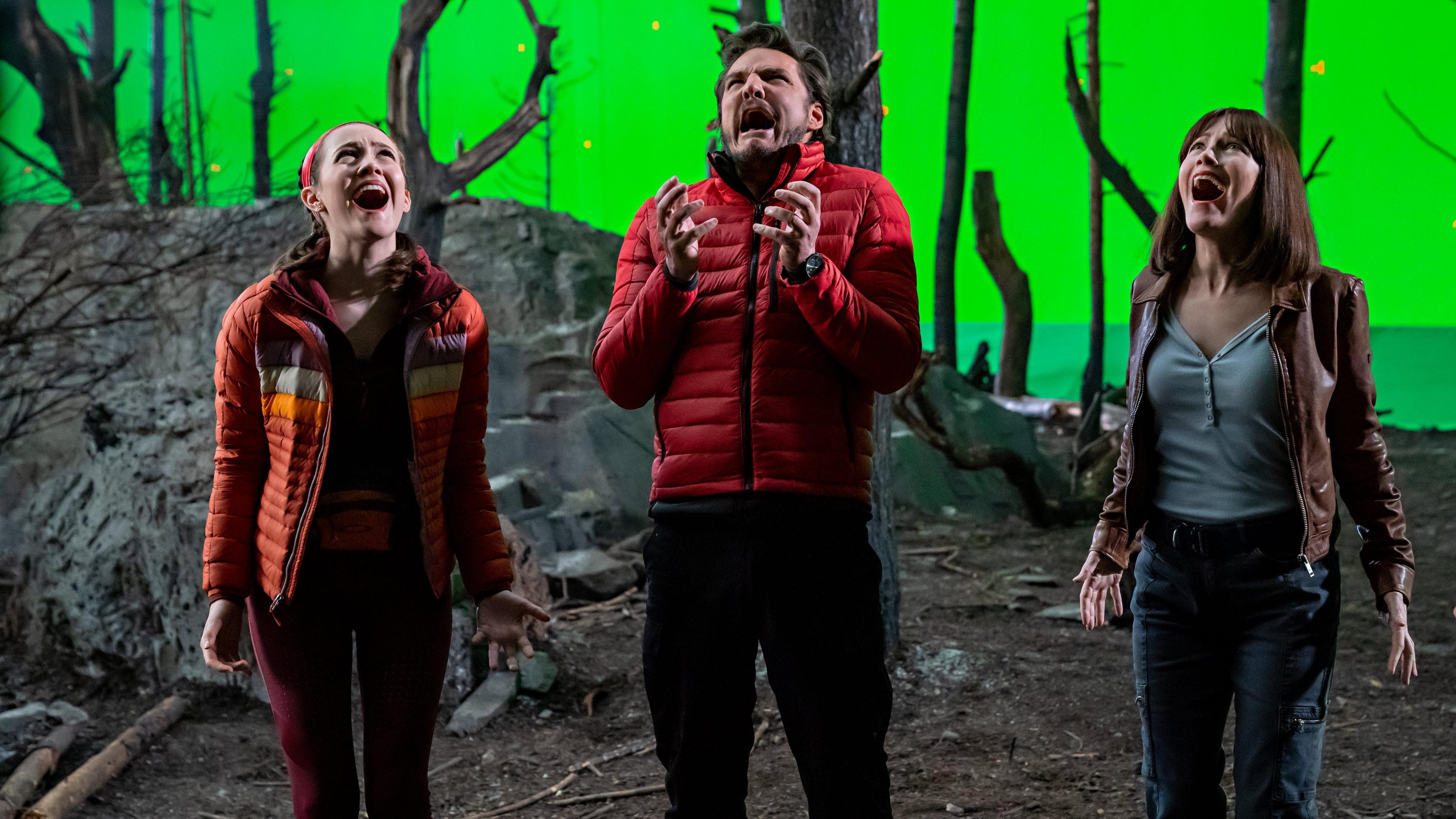Judd Apatow’s The Bubble traps fictional A-listers—and his audience—in a pandemic-era film production
The usually empathetic director offers up a Netflix comedy as soulless as the industry impulses it’s spoofing

If you’re going to make fun of a half-assed, COVID-affected studio feature, it might help to make a studio feature that isn’t actually half-assed and affected by COVID. Uncharacteristically for Judd Apatow, The Bubble is exactly that. It could be that his luck simply ran out after many years of making movies that feel like personal in-jokes that the masses just happen to connect with. More likely with this particular project, he conceived an anemic story and tried to elevate a collection of improvised riff moments from his cast into something coherent.
Sadly, that makes The Bubble perfect for Netflix, where fast-forward allows viewers to skip to the few parts that are genuinely laugh-out-loud funny. Apatow hasn’t lost his sense of humor, just his sense of pacing—and perhaps his everyman-friendly perspective over his years of becoming a Hollywood tastemaker.
Inspired at least in part by Universal’s problems shooting the latest Jurassic World movie under quarantine protocols, The Bubble focuses on a knockoff dinosaur franchise called Cliff Beasts. Now on its sixth installment, shooting kicks off as a pandemic rages, locking each actor in their room for two weeks at a fancy English countryside hotel, making them instantly stir-crazy and irritable. Cabin fever, their competing egos, and the studio’s need for content at all costs quickly reduce the production to pandemonium.
Our sort-of protagonist is Carol Cobb (Karen Gillan), a not-as-young-as-she-used-to-be actress returning to the Cliff Beasts series after making a horrible, accidentally racist movie about Israel, Palestine, and aliens. Leaving behind a boyfriend who refuses to fly, she adapts awkwardly to COVID protocols and collaboration with her estranged castmates. Most testy is Lauren Van Chance (Leslie Mann, Apatow’s wife), a diva in the process of breaking up with franchise star Dustin Mulray (a disheveled David Duchovny, seemingly made up/down to resemble Apatow).
Also present are wanna-be health guru Sean Knox (Keegan-Michael Key), comic relief pothead Howie Frangopolous (Guz Khan), womanizer Dieter Bravo (Pedro Pascal), and the latest cast addition, teenage TikTok influencer Krystal Kris (Iris Apatow). It’s both ironic and oddly appropriate that the director’s daughter gives the movie’s best, most real performance—Judd’s comedy works best when its emotions and interpersonal interactions hit closest to home.
Given Apatow’s track record, it’s not only possible but likely that these characters are all inspired by people he knows or has worked with. Certainly they have their showbiz gibberish down pat, as when Knox pseudo-profoundly offers self-help pearls of wisdom like, “Problems—they’re just lessons in disguise!” But jokes made about the entertainment business, for people already in the business, don’t cut as deeply as those about a scruffy man-child accidentally fathering a kid, or a 40-year-old dad with money problems. Even Funny People understood that Adam Sandler’s comedy star was not the sympathetic character, but the regular people reacting to him. The Bubble half-heartedly creates a secondary ensemble of “normal” people who staff the hotel and maintain the film’s quarantine protocols, but sadly they’re more one-dimensional than the “stars” whose peccadilloes we’re supposed to laugh at.
The infrastructure of the movie-within-a-movie and its documentation by the one Apatow is himself making also don’t sync up. For anyone with a passing knowledge of the business, reality gets left behind when they learn both that Cliff Beasts is the 23rd largest action franchise in the world and that a major studio is bankrolling its $100 million budget. But even in production, it feels more like a knockoff by a cheapie copycat like The Asylum than Universal, particularly with its limited crew and a suitably cartoonish but decidedly inappropriate shot of a computer-generated dinosaur penis.
Meanwhile, to paraphrase one of the actors in another Hollywood parody, if you’re going to go full Tropic Thunder, then go full Tropic Thunder. As vapid executives whose subordinates dare not defy their authority, both Kate McKinnon and John Lithgow enjoy a handful of would-be Les Grossman moments here, but both seem to quickly learn that out-committing Tom Cruise is hard in this sort of role (much less any other), so their threats lack the career-snuffing certainty that makes us believe Cliff Beasts director Darren Eigan’s (Fred Armisen) obsequiousness.
Without some grounding in reality, The Bubble plays like a series of Saturday Night Live sketches, in particular Celebrity Jeopardy: The Movie; that said, plenty of moments are genuinely funny, which comes as no surprise given everyone involved. Pedro Pascal attempting a fake “ethnic” accent skewers what he likely has to endure regularly, while a smart-mirror gag involving a cameo from someone else associated with his most famous franchise will surely spawn a million horrible fanfics. And of course the exaggerated parodies of cliché characters (“Sweet Jesus’ biscuit!” exclaims Van Chance’s “Southern” character) and movie dialogue—“There’s nothing left to eat… but us!”—only reinforce the hackneyed repetition to which Hollywood filmmaker subject their audiences.
But there’s no emotional through line. The movie acknowledges at one point that nobody cares about major movie stars going stir crazy in quarantine, but doesn’t do anything meaningful with that self-awareness. Sure, by the end we understand why bored and locked-down celebrities might turn to drugs as an easy escape, but why should civilians facing harder quarantine protocols and actual economic adversity care if they get the movie finished? The risk of a character’s death from the film’s unspoken disease would add some much-needed jeopardy, but Apatow mostly ignores the pandemic except as a premise for pressure-cooker comedy.
Even if the characters on screen didn’t become better artists during the pandemic, then Apatow at least should have. With The Bubble, he seems to have mistaken jokes about moviemaking for moviemaking that shouldn’t be taken seriously.